Cofactors - Study guides, Class notes & Summaries
Looking for the best study guides, study notes and summaries about Cofactors? On this page you'll find 850 study documents about Cofactors.
Page 2 out of 850 results
Sort by

-
Final Exam: BIOS 256 / BIOS256 (2024/ 2025 Update) Anatomy and Physiology IV Review with Questions and Verified Answers| 100% Correct| Grade A -Chamberlain
- Exam (elaborations) • 29 pages • 2024
- Available in package deal
-
- $10.99
- + learn more
Final Exam: BIOS 256 / BIOS256 (2024/ 2025 Update) Anatomy and Physiology IV Review with Questions and Verified Answers| 100% Correct| Grade A -Chamberlain Q: what are the functions of electrolytes? Answer: control osmosis, regulate body secretions, maintain acid-base balance, carry electric current, serve as cofactors Q: what are electrolytes maintained by? Answer: kidneys reabsorbing/secreting electrolytes, oral/IV intake, secretion of hormones (ADH, aldosterone, PTH) ...
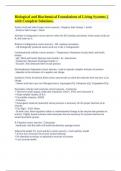
-
Biological and Biochemical Foundations of Living Systems || with Complete Solutions.
- Exam (elaborations) • 18 pages • 2024
- Available in package deal
-
- $13.29
- + learn more
Amino Acid and Side Groups correct answers - Negative Side Groups = Acidic - Positive Side Groups = Basic Absolute Configuration correct answers refers the R/S naming convention. Some amino acids are R, and some are S. Relative Configuration correct answers - D/L naming convention. - All biologically produced amino acids are in the L configuration. Conformational stability correct answers - Temperature: Denatures second, third, and fourth tertiary - pH: Third and fourth; Destroys io...
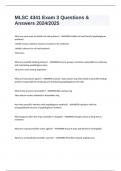
-
MLSC 4341 Exam 3 Questions & Answers 2024/2025
- Exam (elaborations) • 34 pages • 2024
- Available in package deal
-
- $10.99
- + learn more
MLSC 4341 Exam 3 Questions & Answers 2024/2025 What are some ways to inhibit cell wall synthesis? - ANSWERS-Inhibit cell wall directly (peptidoglycan synthesis) -Inhibit enzymes (bind to enzymes involved in the synthesis) -Inhibit cofactors for cell wall synthesis -Bacitracin What are penicillin binding proteins? - ANSWERS-Enzyme groups in bacteria responsible for producing and maintaining peptidoglycan layer -Structure varies among organisms What are beta lactam agents? - ANSWERS...
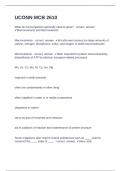
-
UCONN MCB 2610 Question and answers 100% correct 2024/2025
- Exam (elaborations) • 54 pages • 2024
- Available in package deal
-
- $13.99
- + learn more
UCONN MCB 2610 Question and answers 100% correct 2024/2025 UCONN MCB 2610 What do microorganism generally need to grow? - correct answer Macronutrients and Micronutrients Macronutrients - correct answer all cells need access too large amounts of carbon, nitrogen, phosphorus, sulfur, and oxygen to build macromolecules Micronutrients - correct answer often required for protein structure/activity, biosynthesis of ATP by electron transport-related processes Mn, Zn, Co, Mo, Ni, C...
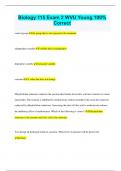
-
Biology 115 Exam 2 WVU Young 100% Correct
- Exam (elaborations) • 15 pages • 2024
- Available in package deal
-
- $9.99
- + learn more
Biology 115 Exam 2 WVU Young 100% Correct control group the group that is not exposed to the treatment independent variable variable that is manipulated dependent variable measured variable constant A value that does not change Dihydrofolate reductase catalyzes the reaction that breaks down folic acid into cofactors to create nucleotides. The reaction is inhibited by methotrexate (which resembles folic acid, but cannot be catalyzed by dihydrofolate reductase). Increasing the ...
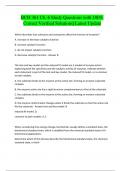
-
BCH 361 Ch. 6 Study Questions with 100% Correct Verified Solutions| Latest Update
- Exam (elaborations) • 16 pages • 2024
- Available in package deal
-
- $12.99
- + learn more
Which describes how cofactors and coenzymes affect the function of enzymes? A. increase or decrease catalytic function B. increase catalytic function C. do not impact catalytic function D. decrease catalytic function - Answer B
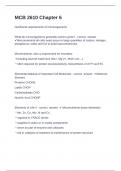
-
MCB 2610 Chapter 6 Question and answers rated A+ 2024/2025
- Exam (elaborations) • 24 pages • 2024
- Available in package deal
-
- $13.49
- + learn more
MCB 2610 Chapter 6 Question and answers rated A+ 2024/2025 MCB 2610 Chapter 6 Nutritional requirements of microorganisms What do microorganisms generally need to grow? - correct answer Macronutreints-all cells need acess to large quantities of carbon, nitrogen, phosphorus, sulfur and O2 to build macromolecules Micronutrients- also a requirement for microbes: *including several metal ions (Na+, Mg 2+, Mn2+,ect....) * often required for protein stucture/activity, biosynthesis...
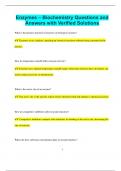
-
Enzymes – Biochemistry Questions and Answers with Verified Solutions
- Exam (elaborations) • 21 pages • 2024
- Available in package deal
-
- $9.99
- + learn more
Enzymes – Biochemistry Questions and Answers with Verified Solutions What is the primary function of enzymes in biological systems? Enzymes act as catalysts, speeding up chemical reactions without being consumed in the process. How do temperature and pH affect enzyme activity? Enzymes have optimal temperature and pH ranges where they function best; deviations can lead to reduced activity or denaturation. What is the active site of an enzyme? The active site is the specific re...
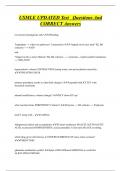
-
USMLE UPDATED Test Questions And CORRECT Answers
- Exam (elaborations) • 176 pages • 2024
-
- $10.49
- + learn more
Cavernous hemangioma risk? bleeding Tryptophan --> what two pathways? 2 mnemonics "tripped on his nice nads" B2, B6 cofactors ---> NAD+ and "tripped on Sir-o-tony's Melons" B4, B6 cofactors ---> serotonin--- hydroxyindole transferase --->MELANIN hyperosmotic volume CONTRACTION (losing water, osm up in plasma) caused by... SWEATING OR DI primary polydipsia results in what fluid changes? expands both ICF ECF with decreased osmolarity adrenal insufficiency volume ch...

-
MCB 2610 Exam 2 Questions and Answers UPDATED 2024
- Exam (elaborations) • 23 pages • 2024
- Available in package deal
-
- $13.99
- + learn more
Macronutrients - carbon, nitrogen, phosphorus, sulfur, oxygen, hydrogen, potassium, sodium, magnesium, calcium, and iron Micronutrients - manganese, zinc, cobalt, molybdenum, nickel, copper All organisms require - Carbon, Hydrogen, Oxygen, and electrons Autotrophs - Assimilate carbon from inorganic sources Heterotrophs - Assimilate carbon in preexisting organic form Phototrophs - Capture light energy to produce ATP Chemotrophs - Capture energy from oxidation of reduced organic ...

How did he do that? By selling his study resources on Stuvia. Try it yourself! Discover all about earning on Stuvia


